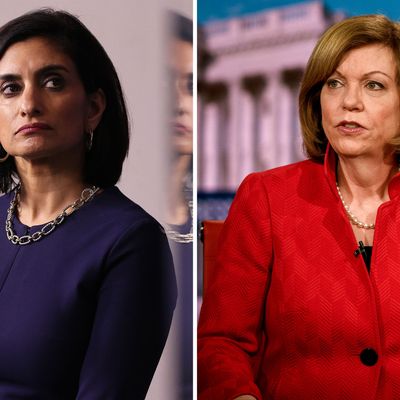
In circles of journalism far from my own, particularly within the Beltway, it’s considered appropriate for journalists and the power brokers they cover to see each other socially, particularly if they are perceived as needing each other’s help to climb the slippery slope to fame. That is apparently the rationalization for the otherwise very fishy discovery that the moderator for next month’s vice-presidential candidate debate, veteran journalist (now with USA Today) Susan Page, hosted a party late in 2018 in honor of Mike Pence’s powerful protégé Seema Verma, who runs the Medicare and Medicaid programs for the Trump administration.
The party, dubbed a “girl’s night,” came to light as part of a U.S. House report (made public by Politico) on pretty heavy taxpayer-subsidized spending by organizer and Republican public relations type Pam Stevens as part of an effort to raise Verma’s profile or improve her brand or whatever euphemism for aggrandizement of the already-powerful you prefer. Turns out Page, not John Q. Public, paid the four grand or so for Verma’s party, but perhaps Stevens separately billed the feds for her consulting work on the event. In any event, the controversy isn’t really about who paid for the party, but whether a working journalist at Page’s level who has been hobnobbing with Mike Pence’s best-known associate in the Trump administration ought to be moderating his debate with Kamala Harris. Matt Yglesias thinks the answer is clearly “no.”
Page’s employer is defending her, unsurprisingly, with a “nothing-to-see-here” statement that she’s part of a group that’s forever celebrating the professional advancement of women in D.C., as the Washington Post reports:
USA Today spokesperson Chrissy Terrell said on Thursday afternoon that Page was “unaware” that the CMS was billed for the event, which the newspaper said was held to honor “two women who had recently gotten significant appointments, Heather Wilson to head the Air Force and Seema Verma to head the Centers for Medicare and Medicaid Services — both milestone moments to be recognized.”
The newspaper defended Page’s decision to host the gathering, which the publication said are “routinely hosted” by female journalists to “honor significant accomplishments of both Democratic and Republican women,” with the journalists footing the bill.
The question isn’t whether Page should have hosted this particular gathering, but whether journalists should be “routinely” hosting social events for the kind of people they are supposed to be covering. Yes, Old Girls Networks like this are more understandable and less ethically objectionable than the Old Boys Networks they emulate, but they still promote the very idea of insular Beltway elites that helped feed the rise of Verma’s and Pence’s mutual boss Donald Trump. Indeed, one of the few Trump accomplishments I truly applaud is his successful effort to sabotage the annual White House Correspondents’ Dinner (a.k.a. the Nerd Prom), wherein journalists and Washington officialdom gathered to lightly tease each other in ways that signaled they had more in common than their very different roles might suggest.
Maybe I’m just finnicky, but in the run-up of this momentous election I’d prefer that a key role in one of its final big moments be played by someone who looks at Mike Pence and Kamala Harris and sees objects for scrutiny rather than subjects of collegiality.






























